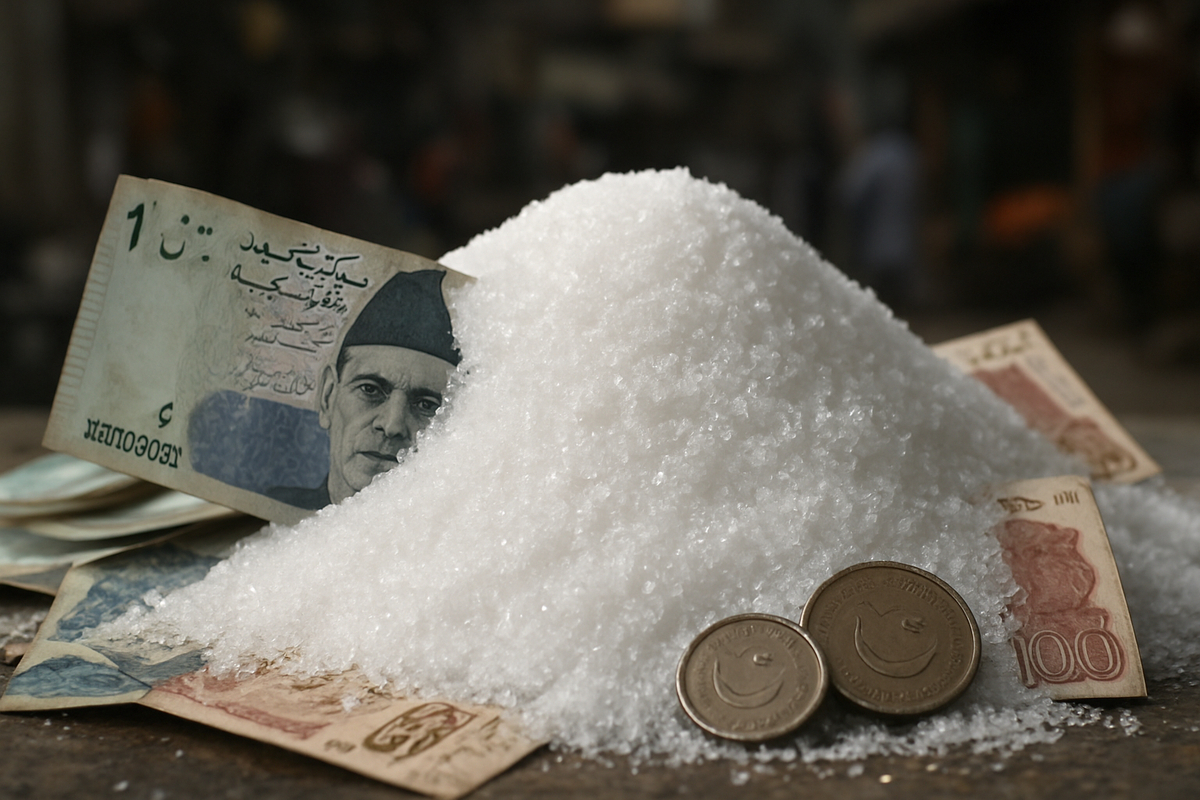
Islamabad, Pakistan – October 24, 2025 – Pakistan is grappling with a severe and escalating sugar crisis, as prices have surged to an unprecedented Rs210 per kilogram in many parts of the country, with some cities reporting prices as high as Rs230. This alarming increase, which has been ongoing since July 2025 and shows no signs of abating, is placing immense pressure on household budgets, exacerbating inflationary pressures, and threatening the nation's economic stability. The continuous rise in the cost of this essential commodity has sparked widespread public outcry and intensified scrutiny of government policies and the powerful sugar industry.
The immediate implications of this price hike are dire for millions of Pakistani consumers already struggling with high living costs. Sugar, a fundamental staple in every household, now demands a significantly larger portion of family incomes, particularly impacting low- and middle-income segments. Businesses reliant on sugar, such as bakeries, sweet shops, and beverage manufacturers, are facing soaring input costs, inevitably leading to higher prices for their products and further burdening the end-consumer. The crisis highlights deep-seated issues within the commodity market, including allegations of cartelization, speculative hoarding, and a lack of effective regulatory oversight, all contributing to an unstable supply chain and volatile pricing.
The Bitter Reality: Unpacking Pakistan's Sugar Price Surge
The current sugar crisis in Pakistan is a complex web of economic, political, and regulatory failures that has seen prices skyrocket to Rs210 per kilogram and beyond. This dramatic increase is not a sudden event but rather the culmination of a series of developments that have unfolded over several months, with significant implications for the nation's economic health.
The sharp upward trajectory of sugar prices began notably after Ramadan 2025, with reports indicating that the Rs210/kg mark was first breached in cities like Islamabad and Karachi by July 2025. Since then, despite government efforts to stabilize the market, prices have stubbornly remained elevated, even reaching Rs230/kg in Faisalabad by October 21, 2025. This persistent inflation has occurred despite a government-fixed rate of Rs179/kg, clearly indicating a disconnect between official policy and market realities. Wholesale prices for a 50kg bag have reportedly hit Rs10,000, reflecting the severe pressure on retailers and, subsequently, consumers. Warnings from industry analysts suggest that if urgent measures are not implemented, prices could further escalate to Rs256/kg.
Key players and stakeholders in this unfolding crisis include the powerful Pakistan Sugar Mills Association (PSMA), representing the interests of sugar producers, who are often accused of controlling supply and prices. The Ministry of National Food Security & Research and the Ministry of Industries and Production are the primary government bodies responsible for policy and oversight. Consumers, represented by various advocacy groups, bear the brunt of the price hikes. Other significant stakeholders include large-scale retailers and independent traders, some of whom are implicated in speculative hoarding practices. The Competition Commission of Pakistan (CCP) has historically played a role in investigating and penalizing anti-competitive practices within the sugar industry, though its effectiveness in the current scenario is under scrutiny.
Initial market reactions have been characterized by panic buying in some areas, coupled with widespread public frustration and protests. Retailers, caught between rising wholesale costs and consumer anger, are struggling to maintain profit margins. There are credible reports of sugar mills halting deliveries in certain regions, further fueling artificial scarcity and price volatility. This situation has led to accusations of a sugar cartel manipulating the market, with calls for strict government intervention and accountability for those involved in price gouging and hoarding. The Public Accounts Committee (PAC) has initiated urgent investigations, demanding detailed records from sugar mill owners and exporters to probe alleged fraud and corruption, underscoring the severity of the crisis and the political pressure it has generated.
Corporate Fortunes in the Sweet and Sour Market
The current surge in sugar prices in Pakistan presents a complex landscape for public companies, creating both potential winners and significant losers across various sectors. The dynamics of supply, demand, and government intervention directly impact the profitability and operational stability of these entities.
The most immediate beneficiaries, at least in the short term, are likely to be the sugar mills themselves, particularly those that have managed to accumulate substantial stocks. Companies such as Al-Abbas Sugar Mills Limited (PSX: AASM), Adam Sugar Mills Limited (PSX: ADAMS), and Baba Farid Sugar Mills Limited (PSX: BAFS), among others, could see their revenues and profit margins temporarily boosted by the higher selling prices of sugar. For instance, Al-Abbas Sugar Mills (PSX: AASM) demonstrated strong revenue growth in MY23, partly due to increased sugar prices. However, this advantage is often short-lived and comes with significant reputational risk and increased government scrutiny. Furthermore, any government-mandated price controls or forced sales at lower rates could quickly erode these gains. The delayed start to the crushing season, often influenced by mill owners to maximize sugar recovery, can also impact overall production costs and farmer relations, as seen in the profitability challenges faced by some mills in MY24 due to increased sugarcane procurement costs.
Conversely, companies that are heavily reliant on sugar as a primary raw material are facing substantial headwinds. This includes a broad spectrum of the food and beverage industry. For instance, FrieslandCampina Engro Pakistan Limited (PSX: FCEPL), a major dairy and food products manufacturer, has seen its gross margins decline due to high inflation and increased input costs, despite strong revenue growth. Similarly, Rafhan Maize Products Co. Limited (PSX: RMPL), a large food processing company, and other prominent food manufacturers like National Foods Limited (PSX: NATF), would inherently face similar pressures. These companies are forced to either absorb these increased costs, thereby squeezing their profit margins, or pass them on to consumers through higher product prices. The latter option risks reducing consumer demand and market share, especially in a price-sensitive market already grappling with overall high inflation.
The government's decision to import sugar, while aimed at stabilizing domestic prices, also has implications. While it may provide some relief to industrial users in the long run by increasing supply, it can simultaneously depress local ex-mill prices, potentially impacting the profitability of domestic sugar producers if the imported sugar is sold at subsidized rates. Furthermore, companies involved in the import and distribution of sugar could see opportunities, but this is also a highly regulated and often politically charged area. The ongoing investigations by bodies like the Public Accounts Committee (PAC) into alleged fraud and corruption within the sugar sector could also lead to penalties and stricter regulations for companies found to be involved in illicit practices, creating an environment of uncertainty for all players. The retail sector, while not having many direct publicly listed entities focused solely on grocery, also faces challenges in balancing higher procurement costs with consumer affordability and government price controls, ultimately impacting their margins and sales volumes for sugar and sugar-containing products.
Broader Implications: A Ripple Effect Across the Economy
The unprecedented surge in Pakistan's sugar prices is far more than an isolated commodity event; it represents a critical juncture that exposes deep-seated structural issues within the nation's economy and agricultural sector. This crisis fits into a broader trend of commodity price volatility exacerbated by global supply chain disruptions, climate change impacts on agriculture, and often, domestic policy inconsistencies. Despite a significant decline in global sugar prices by nearly 20% since October last year, Pakistan's domestic retail prices have surged by 37% since the beginning of 2025, highlighting profound market distortions.
The ripple effects of this sugar crisis are extensive, impacting not only direct competitors and partners but also the overall economic fabric of Pakistan. For consumers, the soaring cost of sugar, reaching Rs 180–200/kg compared to global levels of approximately PKR 102/kg, significantly strains household budgets, exacerbating food insecurity and reducing overall purchasing power. Industries heavily reliant on sugar, such as the confectionery, bakery, and beverage sectors, face substantially increased production costs, leading to higher retail prices for their products, reduced consumer demand, and shrinking profit margins. Farmers, despite government-set support prices for sugarcane, often grapple with delayed payments from mills or payments below official rates, eroding their profitability and trust, and influencing future crop decisions. The government itself faces a significant drain on foreign exchange reserves and public funds through ad-hoc import subsidies, further straining an already fragile fiscal position.
From a regulatory and policy perspective, the crisis highlights the urgent need for comprehensive reforms in Pakistan's sugar sector. The historical pattern of allowing sugar exports during periods of surplus, only to import it at higher prices later, has proven to be financially detrimental. The persistent allegations of cartelization and market manipulation by politically influential sugar mill owners necessitate stronger enforcement by the Competition Commission of Pakistan (CCP) and a transparent regulatory framework. There are strong recommendations for the full deregulation of the sector to foster competition, alongside the implementation of a coherent national policy, rather than reactive, temporary fixes. Policies must also protect farmers, ensure timely and fair payments, and promote efficiency through better crop water productivity and sucrose recovery rates in mills.
Historically, Pakistan's sugar market has been plagued by recurring crises, with major price surges in 2008, 2010, 2020, and now 2025. Each instance has often led to emergency duty waivers on imports and significant fiscal costs. This pattern of short-term interventions, coupled with a history of protectionism and consistent accusations of cartelization by the CCP, has stifled competitive growth and innovation. The situation contrasts sharply with countries like Brazil, where deregulation in the 1990s led to significant productivity gains and global export dominance. Pakistan's low sugarcane productivity (54.6 tonnes per acre compared to Egypt's 120 tonnes per acre) further underscores the deep-seated inefficiencies that contribute to these cyclical crises, undermining investor confidence and hindering sustainable economic growth.
The Road Ahead: Navigating Pakistan's Sugar Future
The path forward for Pakistan's sugar market is fraught with both challenges and potential opportunities, demanding strategic pivots and adaptive measures from all stakeholders. In the short term, the government faces immense pressure to stabilize prices and ensure adequate supply. This will likely involve continued efforts to import sugar to bridge the immediate demand-supply gap, alongside intensified crackdowns on hoarding and speculative activities. The ongoing investigations by the Competition Commission of Pakistan (CCP) into alleged cartelization, with hearings for over 80 sugar mills scheduled, could lead to punitive actions against individuals and entities found guilty of market manipulation, potentially restoring some public trust and deterring future illicit practices. The upcoming sugarcane crushing season, expected around November 20, 2025, is a critical short-term factor, as its success in terms of yield and efficient procurement will heavily influence supply and prices in the coming months.
In the long term, sustainable solutions require a fundamental restructuring of the sugar sector to address deep-seated inefficiencies. Pakistan's sugarcane yield (46 tons per hectare) significantly lags behind global averages (over 60 tons per hectare), highlighting a critical need for improved farming techniques, high-yield varieties, and better irrigation systems. The debate over market liberalization versus regulation continues, with calls for deregulation to foster competition, but also concerns about potential farmer exploitation if not carefully managed with robust safeguards. A strategic pivot for the government involves implementing comprehensive policy reforms that move beyond reactive measures to a cohesive national sugar policy, strengthening regulatory oversight, and rationalizing export policies based on verified domestic surpluses. For the industry, adaptations include modernization and efficiency investments, diversification into value-added by-products like bioethanol from molasses, and the adoption of sustainable agricultural practices.
Emerging market opportunities lie in expanding bioethanol production, leveraging Pakistan's capacity to address energy needs, and potentially boosting sugar exports to emerging markets in Asia, Africa, and the Middle East with quality enhancements. Further diversification into utilizing bagasse for electricity and paper production can also create significant value. However, significant challenges persist, including stiff global competition from major sugar-exporting nations, the increasing impact of climate change on water-intensive sugarcane cultivation, and growing health awareness regarding sugar consumption that could shift long-term demand. The most persistent challenge remains the deep-rooted issue of inconsistent government policies and the significant political influence of sugar mill owners, which often prioritizes specific interests over broader economic stability and consumer welfare.
Potential scenarios for the coming months and years range from a "business as usual" outcome, where the cycle of price surges and temporary government interventions continues due to a lack of fundamental reforms, to a "successful reform and deregulation" scenario. The latter would involve the government demonstrating strong political will to overcome entrenched interests, leading to a more stable, competitive market with fairer prices for consumers and farmers. Conversely, a "worsening crisis" scenario could see prices escalate further (potentially to Rs250/kg), severe shortages, and a further erosion of public trust if interventions prove insufficient and manipulation persists. The future of Pakistan's sugar market hinges on a decisive shift from reactive measures to proactive, transparent, and comprehensive reforms that prioritize long-term sustainability and the welfare of all stakeholders.
Sweetening the Future: A Comprehensive Wrap-up
The ongoing sugar crisis in Pakistan, marked by prices soaring to Rs210/kg, serves as a stark reminder of the vulnerabilities inherent in the nation's commodity markets and the critical need for comprehensive economic reforms. The key takeaways from this event underscore the detrimental impact of policy inconsistencies, the pervasive influence of powerful industry cartels, and the severe burden placed on the average consumer. The crisis has exposed a cycle of reactive measures—export bans followed by import decisions—that have consistently failed to address the root causes of price volatility, leading to a significant drain on national resources and public confidence.
Moving forward, the market will remain under intense scrutiny. Investors should closely monitor government actions, particularly regarding the implementation of anti-hoarding measures, the success of sugar import initiatives, and any concrete steps towards structural reforms in the sugar sector. The outcomes of ongoing investigations into alleged market manipulation will also be crucial in shaping the regulatory landscape. Companies in the sugar industry, such as JDW Sugar Mills Limited (PSX: JDWS) and Dewan Sugar Mills Limited (PSX: DEWS), will need to navigate increased regulatory pressure while also adapting to fluctuating supply and demand dynamics. Conversely, food and beverage companies like National Foods Limited (PSX: NATF) and FrieslandCampina Engro Pakistan Limited (PSX: FCEPL) will be closely watching raw material costs and consumer spending patterns, potentially exploring cost-cutting measures or product reformulations.
The lasting impact of this crisis could be profound, potentially accelerating the demand for greater transparency and accountability in commodity markets. It might also spur a broader conversation about food security and the need for diversified agricultural policies, moving away from over-reliance on a single cash crop. For investors, the coming months will be critical for identifying companies that demonstrate resilience, adaptability, and a commitment to ethical business practices amidst ongoing market turbulence. A shift towards sustainable agricultural practices, coupled with robust regulatory frameworks that prioritize fairness and efficiency, is not just an economic imperative but a social necessity for Pakistan to emerge from this bitter crisis with a sweeter, more stable future.
This content is intended for informational purposes only and is not financial advice





